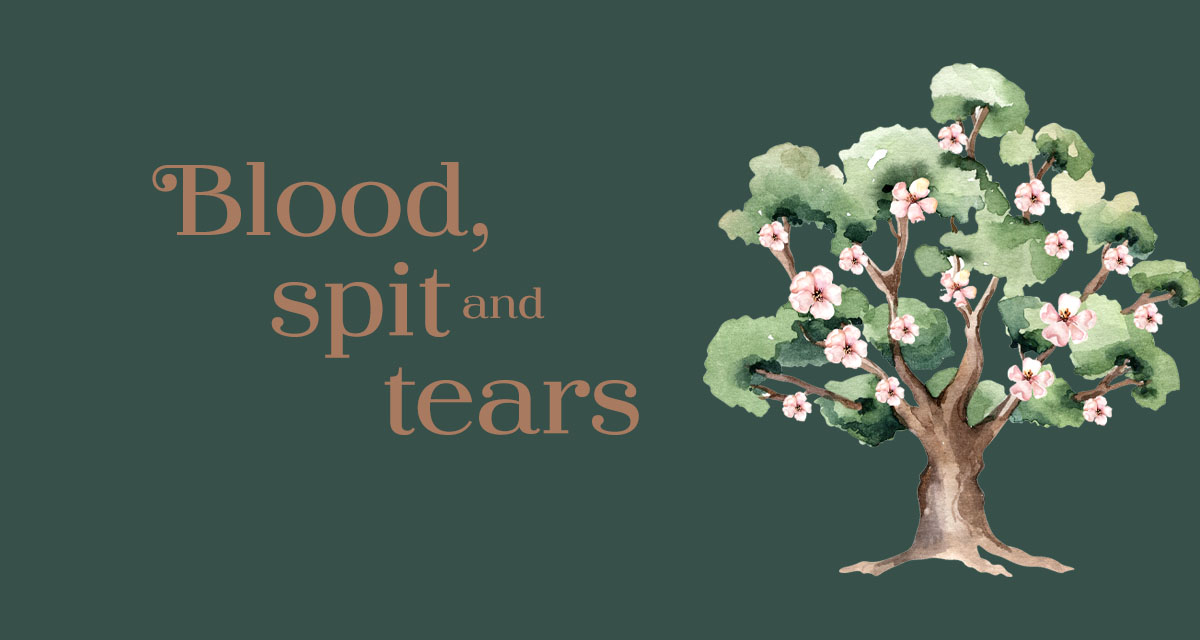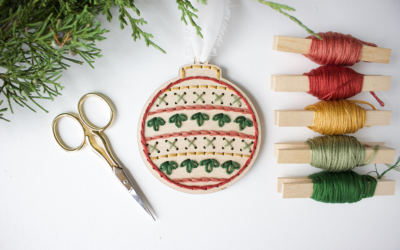By Jared Fiel
In 2009, Lori Daigle, the youngest of two siblings, was married to a guy and the only blood relatives she knew were her two kids. Today, none of that is true.
Over the years, Lori has managed to conquer multiple rejections and found love and a much bigger family thanks to DNA…and Facebook.
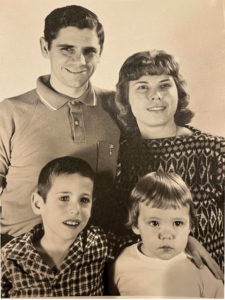
Lori’s adopted parents, Lawrence and Grace Daigle, her brother Bruce, and Lori, 1966.
Growing up different
From a very early age, Lori knew she was adopted. Her parents made sure she felt loved, so she never thought about it, unless she wanted to threaten them.
“When I was pissed at my parents for something,” she says and laughs, “I would tell them, ‘I’ve got another family that’s better than this one.’”
Lori’s adopted parents, Lawrence and Grace Daigle, worked hard to create a loving home for her and her older brother, Bruce, who was also adopted a few years before Lori. But over the years, not sharing DNA started to show. “As I got older, I didn’t look like them. I didn’t think like them. I felt like an imposter,” she says.
The difference really showed as Lori pursued her passion for sports. “My parents were not athletic at all, but they were very supportive. They went to all my games and cheered me on even when I had to explain to my mom what was happening,” she says.
She was playing softball on her high school team when she met Liz Barnez. The two had a close connection on and off the field. Lori remembers holding hands and even kissing a few times, but they never talked about it.
Later, at 19 while at college, Lori informed her Catholic parents that she was gay. It didn’t go over well. “They offered to get me help…to ‘fix’ me…to get me straight,” she says. She was essentially kicked out of the family.
Five years later, she was able to come back home to the family. “I lied to them,” she says. “I told them it was a phase. And all was forgiven.”
Around 1992, Lori started running and, while trying to sign up for her first 5K in Arkansas, she met Jim Herman. “I was lost, and he smiled at me and helped me get to registration,” she says. After the race, he tracked her down and asked for her phone number.
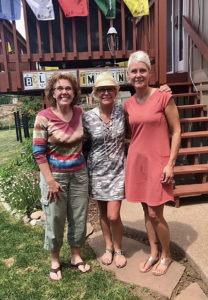
Lori pictured with half-sisters Jean and Jill at their first meeting, June 2018.
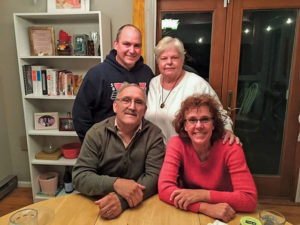

Lori, with her birth father James White, her half-brother Andy, and James’ wife Percy, September 2018.
They dated for 11 months and then got married. “I liked him. He was really cute, and we had fun together. He was incredibly smart,” she says, adding he never knew she was gay. “It felt like the thing to do. I felt like this flawed and broken person, and he liked me.”
The couple had two children, Haley in 1994 and Robert in 1997. “Haley was the first person I ever met who shared my DNA,” Lori says. “And, damn, if she didn’t look just like her dad.”
After 17 years of marriage, the couple drifted apart and divorced in 2009. Two weeks later, a high school friend posted something on Facebook and Lori was surprised to see Liz Barnez liked the post.
Liz was living in Fort Collins and Lori was in South Carolina, but the two connected through private messages. Lori came to visit Liz in August and Liz went to see Lori in September. They knew this was the real deal.
Next, it came time to tell her kids (who took it well) and then to tell her parents about their relationship. They had a difficult time at first, but her parents eventually came around. “I guess they figured I wasn’t going to outgrow it,” Lori says and laughs.
Connecting with the past
While Lori was not really interested in finding her biological family, Liz was. “She was so curious. She just kept asking me to contact Catholic Charities to see if I can find out anything,” Lori says. “Finally, I told her that if she started the process, I would take it from there.”
A little checking revealed Lori’s birth mother’s name and contact information and the name of her father, James White. Apparently, the young couple had Lori when they were about 16. They broke up soon after.
Lori reached out to her birth mother with a letter and received a phone call on Lori’s 50th birthday. Her birth mother had never told her current family about giving up Lori or another half-sister named Sherrie. Lori maintained a brief email correspondence with her birth mother but getting to see each other wasn’t in the cards.
Lori and Liz married in July 2015. Liz was still insistent that Lori find out more about her biological family. But tracking down a guy with a common name like James White proved to be nearly impossible.
But that all changed in 2017 thanks to some spit in a tube, as Lori calls it.
After seeing all the information popping up about genetic testing, Liz and Lori decided to do a test through Ancestry.com, which came down to filling up a test tube with spit (“It is seriously a lot of spit,” she says) and filling out the application. One of the questions asks if the person wants to be matched with others in the system. “Liz thought I should check the box, so I did,” Lori says. “It didn’t feel threatening anymore. I didn’t care about rejection because it didn’t matter. I was happy.”
A few weeks went by, and they hadn’t heard anything about the test results. “On Sunday night we were joking about this whole thing being a scam,” Lori says. “The next day, I got a Facebook message.”
The message was from Jean Engebretson, explaining that Jean’s father had told her he had given up a baby girl in 1963. Ancestry.com had informed her that she was a “closer than first cousin” match with Lori. And then she mentioned her father’s name, James White.
Lori yelled, “Liz! You have to read this.”
Liz and Lori crafted a response together. The messages between the lost sisters flowed freely after that. Jean was one of three children of James White and his wife, Percy. The others are Jill Niebrugge and Andy White.
“I was super excited to tell Andy and Jill about Lori,” Jean says. “They were both curious about where this could go. I took a bit more time telling my dad since I really wasn’t sure how he was going to react. Once the shock wore off, both of my parents had a lot of questions about her.”
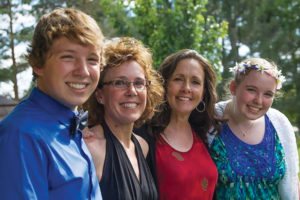
Rob, Lori, Liz and Haley in 2015,
on Lori and Liz’s wedding day.
Love heals all wounds
There were a lot of questions. And photo swapping. And video chatting. “It was in an instant. I loved them and they loved me,” Lori says. “It was strange because I was raised as the baby of the family, but I never acted like it. And now I am the oldest.”
Jean had a similar experience. She says, “I think it’s pretty cool having a big sister. That had been my role my whole life, but I never really felt like the oldest child!”
Jean and Jill made the trek out to Colorado for Lori’s 55th birthday and even wore their best 1980s apparel for the theme of the night.
Jill describes that meeting, “I felt nervous, excited, curious, emotional and, at the same time, calm, as we stood in the Denver airport hugging each other. It felt natural and familiar with an instant connection, and from there, it was so neat to see and discover how much we were alike and learn more about each other.”
Lori says she felt like she knew them from the start. “I never had to explain myself to them. They could care less I was gay. They never had any reaction,” she says. “For an adopted kid with a lot of trust issues, I felt like I belonged.”
Andy, James and Percy White came for a visit in 2018 with similar results. “As the first meeting progressed,” Andy says, “I could definitely see we shared genetics and had a very similar sense of humor.”
The new siblings and birth father keep in contact with visits and, especially during the pandemic, email and phone calls. “My hope is that we will continue to grow our sisterhood,” Jean says. “COVID has put some time between visits, but I think of Lori every day. Also, I feel connecting to Lori has strengthened my relationship with my sister Jill.”
Through all of this, the only two people in the world that Lori thinks of as her parents, Lawrence and Grace, were supportive. Grace died in 2013, knowing that Lori had found her birth mother. Lawrence has continued to be there for her.
“My dad is my dad. He has been there for my best days and my worst days,” she says. Lori still talks to Lawrence every weekday morning on the phone, a promise she made to her mom when she was dying.
“This whole thing really forces people to come to terms with what family is,” Lori says. “I came from an itty-bitty family and now I have a great big family and I love it.”

